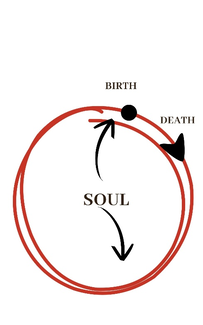From straight lines to circles
After my first article, my colleague the author Nayla Hillani said: we only own the moment we live in now and we have to invest in the moment. We don’t own the past or the future. That’s why I don’t carry a watch anymore out of a personal philosophy that time shouldn’t chain me.
Out of the movie the arrivals I realised that time is man made to arrange daily duties. So we have to invest in our time not manage time. The insight of time that time is abstract and time is not a straight line, it’s a circle.
Does life define time?
If our experience of time isn’t a fixed external chain, what is it? The answer, I believe, depends entirely on our belief what happens after we die. Our end point defines the shape of our timeline.
The straight line:
Timeline as finite segment
If you believe that “we live and die and life ends,” then time is a simple, straight line or a finite segment.
This view aligns with secular or materialistic philosophies https://en.wikipedia.org/wiki/Secularism. Time being at the moment of your birth and concludes permanently at the end of your consciousness (death). Your entire journey is a one-way arrow, moving forward without a rewind or a reset. The is a definitive start and a final stop, meaning your personal chronological time is fixed and non-repetitive. In this model the urgency to “invest in the moment” is at its highest, as the moment is all you will ever truly have.
Timeline as multiple finite segments
The view of time changes if you believe in rebirth: “if we live then die then live again.” Here, time is not one straight live, but multiple segments in a straight lines sequenced together. This model is supported by reincarnation base philosophies https://en.wikipedia.org/wiki/Reincarnation. Each life is a self-contained, linear segment of time on earth. When the spirit or soul dies, it exits time for a period, only to re-enter a new separate linear timeline with its next birth. The total existence of the soul is a collective series of discrete, separate segments, making the overall flow of time segmented and intermittent, like chapters in a very long book.
The circle:
Time as an infinite loop

The most complex and fascinating model arises from the idea that we are eternal spirits on a temporary journey: “we used to exist as souls and the we are sent to earth we live then we die then we go to heaven or hell. Where there is no time and we live forever.” This model is supported by Abrahamic- adjacent or transitional spiritual philosophies https://en.wikipedia.org/wiki/Abrahamic_religions , particularly your insight on the lack of time in the afterlife.
In this model, time is a circle because your existence starts and ends in the same place: Eternity, a place where linear time does not exist. Your Earthly life – the period of measurable, chronological time – is merely a temporary detour. Its an arc that takes you our of the timeless state and then returns you to it. The entire journey (timeless to time to timeless) completes a cycle, a circle, where the spirit returns to its original, non-chronological state. In this circular view, the purpose of the straight line (life on earth) is defined entirely by the large eternal cycle.
Ultimately, whether we see our time line as a line, multiple lines, or a circle depends on what we believe about the journey of the self. The only one we can truly own is the precious NOW.
The loop of the circle doesn’t end here. In our daily lives we tend to go to the past in memory, and review our past experiences. Then back to the present. Or, we travel to the future to create our plans and illusions using imagination. This adds a circle where our subconscious mind doesn’t know time. It just operates on feeling. Dr. Joe Dispenza explains “the subconscious mind operates on emotional states and past experiences rather than linear time, linking feelings to past events to create present reactions and influencing future outcomes.”
Ultimately, regardless of whether our timeline is a segment, a segmented sequenced straight-line , or a grand circle, the core truth remains: time itself is not a resource given to us to own and manage, but a condition we are given to pass through. We were indeed blessed with tangible gifts to manage—our body, our sight, our brain, our life, our children, and the potential of our being—but time is a hyper-blessing that God chooses for us to inhabit temporarily. This suggests a radical shift in perspective: instead of asking how we can manage the clock, we must ask how we can invest our spirit in the precious, limited moments we are granted. This reframing opens the door to an astonishing possibility: What if we have already lived our lives? What if the temporal arc of our Earthly existence was seen and chosen by our eternal spirit before we were ever born, making this life not a chaotic journey, but a perfectly selected experience designed to define our relationship with the NOW? If this is true, our true purpose is not to race against the man-made clock, but to fully realize the value of the moment we are in, fulfilling the deliberate investment made by the eternal self.